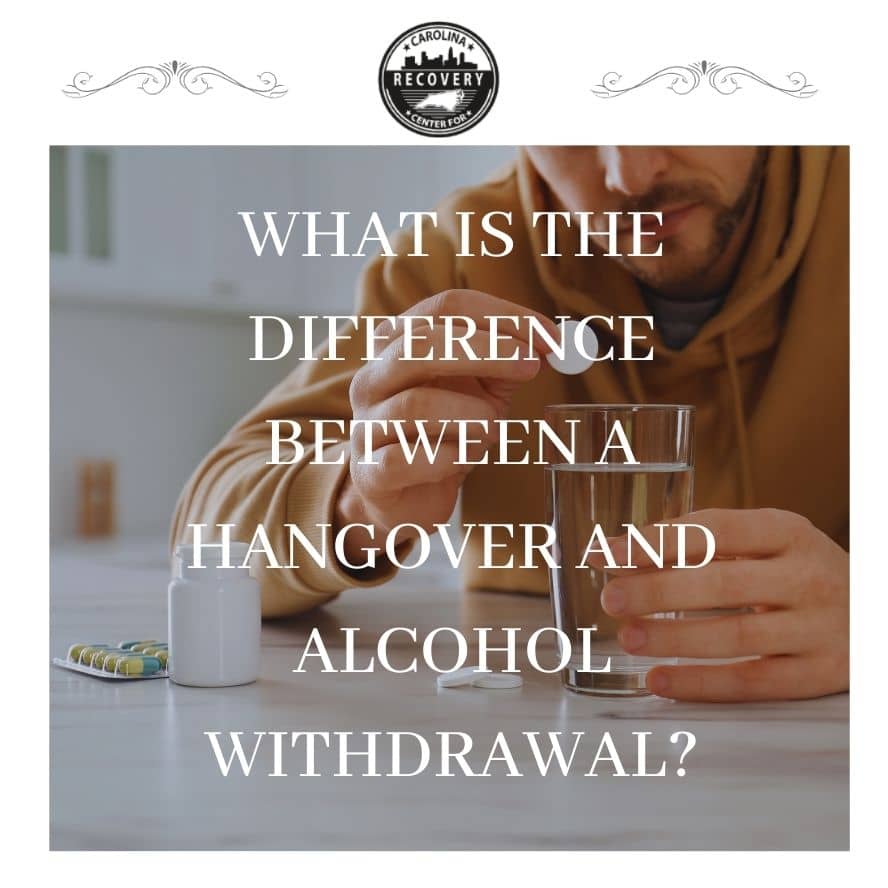What is the Difference Between a Hangover and Alcohol Withdrawal?

Medically Verified: 2/1/24
Medical Reviewer
Chief Editor

All of the information on this page has been reviewed and verified by a certified addiction professional.
Have you ever woken up after a long night of drinking with a pounding headache? Felt nauseous and shaky after partying a little too hard on your birthday? If so, you have probably had a hangover.
While hangovers and alcohol withdrawal syndrome have some symptoms in common, they are two distinct physiological processes. Unfortunately, many people get the two conditions confused, and this can be dangerous because alcohol withdrawal can be serious and life-threatening. Knowing the difference between a hangover and alcohol withdrawal can be the difference between life and death.
If you frequently abuse alcohol, it is important to understand the difference between a hangover and alcohol withdrawal syndrome.
What is a Hangover?
According to the National Institute of Alcohol Abuse and Alcoholism (NIAAA), “A hangover refers to a set of symptoms that occur as a consequence of drinking too much.”[1]
When you drink large amounts of alcohol, you might feel bad the next day. This is referred to as a hangover, which affects most people who drink excessively.
The symptoms of a hangover include:
- Dehydration
- Nausea or vomiting
- Fatigue
- Headaches
- Not getting enough sleep
- Sensitivity to light
- Mood changes like depression, anxiety, or irritability
Several factors can contribute to the development of a hangover, including mild dehydration, disrupted sleep, irritation of the gastrointestinal system, inflammation, and exposure to acetaldehyde.[1]
If you experience a hangover, that does not mean you are addicted to alcohol. It simply means you drank too much the night before. These symptoms typically subside within 24 hours once your system has had the time to recover from drinking.
Understanding Alcohol Withdrawal
The main difference between a hangover and alcohol withdrawal is that a hangover is caused by too much alcohol, while withdrawal is caused by a lack of alcohol and physical dependence. While a hangover is sometimes considered a mild form of alcohol withdrawal, alcohol withdrawal syndrome only occurs among people who are dependent on alcohol. Physical dependence means the brain and body rely on the substance to function properly due to frequent and long-term alcohol use.
Alcohol withdrawal can be incredibly dangerous, especially if you were addicted to alcohol for a long time. As a result, you should always receive professional medical care when you are experiencing alcohol withdrawal.
Symptoms of alcohol withdrawal include:
- Restlessness
- Shakiness
- Excessive sweating
- Loss of appetite
- Nausea or vomiting
- Agitation and irritability
- Anxiety
- Fast heart rate
- Tremors
- Disorientation
- Headaches
- Insomnia
- Seizures
While the symptoms of alcohol withdrawal may seem similar to a hangover, there are some ways to differentiate the two processes. With a hangover, your initial symptoms tend to be the most severe and they subside within 24 hours. When you are experiencing withdrawal, the most severe symptoms will arise between 24 to 72 hours after your last drink. Alcohol withdrawal can last a week or longer.
Why Alcohol Withdrawal Requires Professional Treatment
While a hangover does not cause severe side effects like seizures and increased heart rate, alcohol withdrawal does. Additionally, hangovers subside within 24 hours. Alcohol withdrawal can last over a week after your last drink.
Alcohol withdrawal can become deadly without treatment. One of the main risks of alcohol withdrawal is a condition called delirium tremens (DTs). This condition can be life-threatening without medical treatment.
The symptoms of delirium tremens (DTs) include:[2]
- Tremors
- Chest pain
- Confusion
- Extreme sleepiness
- Dehydration
- Excitability or aggression
- Fever
- Hallucinations
- Excessive sweating
- High blood pressure
- Vomiting
- Rapid heartbeat
- Passing out
- Seizures
- Severe hyperactivity
- Stupor
- Hallucinations
Without treatment, delirium tremens can cause life-threatening effects such as seizures, irregular heartbeat, trouble breathing, and even sepsis. Delirium tremens has an estimated mortality of up to 37% without appropriate treatment.[3]
How is Alcohol Withdrawal Treated?
Alcohol withdrawal is best treated within a medical detox facility. An alcohol detox center will provide you with the medical supervision, treatments, and medications necessary to keep you safe and comfortable throughout the detoxification process.
Alcohol detox may involve:
- An initial assessment to determine your needs
- 24/7 medical supervision to monitor vitals and overall safety
- Constant access to psychological support
- Medications to manage your symptoms and prevent alcohol withdrawal from becoming severe
- Treatment for conditions like delirium tremens if needed
- Referrals to additional treatment programs like inpatient or outpatient alcoholism rehab
Finding Help for Alcohol Abuse and Addiction
If you or a loved one suffer from frequent alcohol abuse or alcoholism, professional treatment can help. Long-term alcoholism can lead to a variety of issues, including health complications like severe withdrawal and delirium tremens. These conditions can be life-threatening without proper medical attention.
At Carolina Center for Recovery, we pride ourselves on providing our patients with everything they could possibly need. From medical detox and 24/7 health monitoring to evidence-based behavioral therapy and relapse prevention planning, we can offer you a strong foundation for recovery to build upon for years to come.
To learn more about our alcoholism rehab programs, contact Carolina Center for Recovery today.
References:

